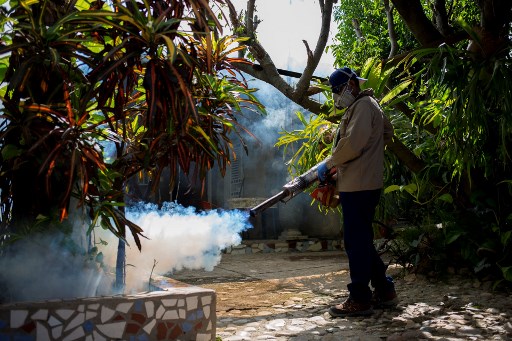
by Margioni BERMÚDEZ
BARCELONA, Venezuela (AFP) — Luz Martinez has caught malaria three times, the last of which was when she was six months pregnant with her fourth child. Like many Venezuelans, she fears malaria more than Covid-19.
In her dusty neighborhood on the outskirts of Barcelona, in the eastern state of Anzoategui, some people have contracted malaria up to 20 times.
“I gave it to my 12-year-old girl and also to my other child … thankfully we’ve received treatment,” said Martinez, 30, whose fourth child was born two months premature.
“There’s quite a lot of malaria here,” said Martinez, whose sand floor home is invaded by clouds of mosquitos every night at dusk.
Venezuela was the first country to eradicate malaria in 1961 — but the disease, carried by the Anopheles mosquito, has seen an alarming explosion over the last decade.
“Many people have come down with malaria in the last two months. Some people have had it 15 to 20 times,” said Leonardo Vargas, a communal anti-malaria activist.
The government has not published figures on malaria since 2016, but according to the Venezuelan Society of Public Health NGO — using 2018-2020 World Health Organization data — the country has the highest number of malaria cases in the region.
In 2019 there were 400,000 cases of malaria in Venezuela, or more than half of the combined malaria cases of Brazil, Peru and Colombia, the NGO said.
Public health measures had pushed malaria into remote jungle regions, but during the last decade the disease “has moved from the jungle to the cites,” said Jose Felix Oletta, Venezuela’s health minister 1997-1999.
Oletta has hit out at the government “abandonment” of anti-malaria programs over the last 20 years.
“This has enabled the return of one of the horsemen of the Venezuelan health apocalypse,” said Oletta, blaming the state for “underestimating” the malaria problem.
House to house search
Oletta, a member of the private sector Venezuelan Society of Public Health, says that many patients come from southern jungle mining regions where illegal mining has been growing.
In 2019 Venezuela had 400 active outbreaks that accounted for 73 percent of malaria deaths in all of South America, said Oletta.
That year, it affected more than 400,000 people.
According to the WHO, which has named April 25 as World Malaria Day, there were 229 million cases worldwide in 2019 and more than 400,000 deaths, mostly in Africa.
In Venezuela the situation is especially dire “due to the pandemic, which consumes all resources,” said Oletta.
Venezuelan hospitals are overwhelmed with Covid-19 patients, and pandemic lockdowns have made reaching the worst affected regions more difficult.
The NGO Doctors Without Borders (MSF) and Venezuela’s health ministry have launched operations in badly affected communities to try to reduce the number of malaria cases.
“We’re going house to house … actively looking for malaria cases,” and fumigating, said Gustavo Liscano, the leader of an MSF team working in Anzoategui state.
There are eight groups working on the ground performing rapid blood tests on those feverish patients, delivering medicines to treat the disease, donating mosquito nets and diagnosing pregnant women.
MSF says these measures have greatly reduced cases in Anzoategui.
Luz Misel said she feared for her baby before receiving a mosquito net.
“I got malaria a year ago, it was horrible, I had a fever, a headache, shivers,” said Misel, who said her baby used to wake up with red bite marks all over its body.
© Agence France-Presse







